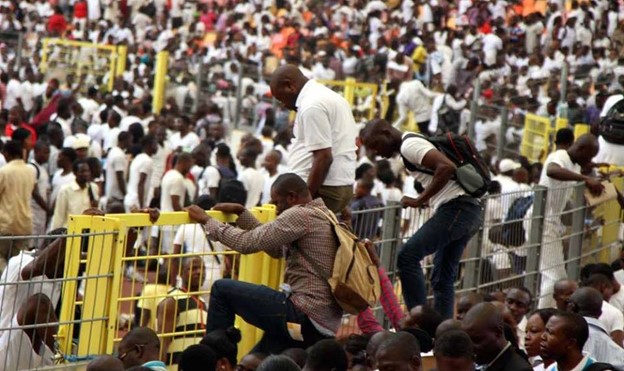[By Patrick James]
The National Bureau of Statistics (NBS), in the 2019 Poverty and Inequality in Nigeria Report, stated that two out of every five Nigerians are living below the poverty line. This means that two Nigerians out of an estimated five will have to survive on less than a dollar (about 410 naira) per day. Between Q4 2020 and Q1 2021, the Nigerian unemployment rate hit an all-time high of about 33.3% from the previous record of 27.1% in early 2020.
Putting all these in proper perspective, it is estimated that the number of unemployed Nigerians is currently standing at 23,187,389. According to the labour force report published by the NBS in March 2021, a combination of both the unemployment and the underemployment rates for the reference period amount to a staggering 56.1%.

Photo: Nigerian youths grappling for entrance into the venue of the ill-fated 2014 recruitment exercise of the Nigerian Immigration Service that claimed several lives.
Source: Google
In layman’s terms, it simply means that we have more unemployed people in Nigeria than the entire population of some African countries. No, that’s not a joke! Burkina Faso has a total population of 20,903,273; Mali has a population of 20,250,833; Malawi has a population of 19,129,952 and Zambia has a population of 18,383,955. Our close neighbour, Chad, has a total population of 16,743,927. Somalia and Namibia have a population of 15,893,222 and 2,540,908 respectively.
We are not talking about those who are underemployed here, just the unemployed ones. If we add both, only the population of two countries in Africa—Ethiopia with a population of 114,963,588 and Egypt with a total population of 102,334,404—would be more than the total number of unemployed and underemployed people in Nigeria.
When we talk about unemployment, we are directly talking about youth restiveness in the country. We are also talking about youths, the acclaimed future leaders of tomorrow without jobs or any means of livelihood. Little wonder we are witnessing an unprecedented surge in crime, banditry, kidnapping and terrorism in the country.
Youths who are to make a lasting impact in the I.T sector have taken to cybercrime (yahoo-yahoo) just to survive. Others who do not have the patience or skillset to indulge in cybercrimes have taken up kidnapping and petty theft as means of survival.
I would have loved to place the entire blame of this humongous level of unemployment in Nigeria on bad leadership, but the youth of this country are accomplices to the ills that have befallen them. They refuse to do something to change the status quo. Worse still, they even help to rig in bad leaders —who are the architects of their misfortunes —into power.
A quick look at the presidential election of 2021 shows that the All Progressive Congress (APC) who won the elections got 15,191,847 votes while the opposition—People’s Democratic Party (PDP) got 11,262,978 votes. If the over 23 million unemployed people in Nigeria unite to form a political party, they can defeat the incumbent government and perhaps end unemployment in Nigeria. But they would rather feign indifference or total resignation. The rest would become lapdogs to these politicians, begging to take the scraps that fall off their table, rather than take a step forward to change the course of this unfortunate trajectory.
It is a pity that a country with so many endowments, both in human and natural resources would still be occupying the number one position as the poverty epicentre of the world. For the record, Nigeria also has one of the highest out-of-school children figures in Africa, with an estimated 10,193,918 children out of school as at Q2 2021.
How long can we continue to regress? For how long can we keep leading in negative things? Things cannot continue to be this way. It is not enough to shout and complain all the time. Things should change and the time to change for the better is now. But how exactly do youths expect to effect change when they don’t even have their PVCs? How do they expect to vote in their choice candidates when they have blatantly refused to complete the Continuous Voter Registration (CVR) process?
Recently released statistics from the Independent National Electoral Commission (INEC) with regards to the number of youths that have completed their registration is very discouraging. As of Monday, November 22nd, only 1,326,067 have completed their registration. What are the others doing? Waiting to sing FEM again at another protest? The Nigerian government has shown time and again that it is no stranger to violence, and will descend to unimaginable levels to perpetuate and cover up its heinous crimes.
If we are to beat them at their game, we must do more. We must put aside our selfish interests and apathy and work together to elect representatives who are passionate about transforming Nigeria and have the mental capacity to serve.

- Patrick James is a creative writer, poet, and columnist based in Lagos.
